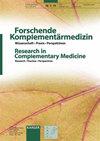25th Anniversary of the TCM Hospital Bad Kötzting - Happy Birthday to You!
引用次数: 1
Abstract
dients of Chinese medicinal drugs used for inpatient treatment. Responsible for this area of interest are Hildebert Wagner of the Center for Drug Research of the Ludwig-Maximilians-Universitat Munich and Rudolf Bauer of the Institute of Pharmaceutical Science, Department of Pharmacognosists of the Karl-Franzens-Universitat Graz. Especially in Germany, there is a long tradition of classifying active herbs and their chemical constituents. For this reason, the monographs on TCM drugs resulting from this work are important features of the scientific activities, as indicated in the cover of this issue and the article by Wagner et al. [3]. TCM is under increasing pressure to show therapeutic efficacy and lack of side effects as well as to improve clinical quality continuously. Therefore, a ‘complication screening program’ with an effective adverse event reporting system for all used methods in the clinic has been established. We especially stress the absence of toxins, contamination and adulteration in order to avoid risks for the patients. The article by Melchart et al. [4] describes a model of safety monitoring and risk management in TCM drugs, so that risks can be identified early. Both Eastern and Western medical systems will benefit from additional TCM approaches, modified according to modern scientific requirements – these objectives are shared by all members of the scientific board.中医院成立25周年Kötzting -祝您生日快乐!
本文章由计算机程序翻译,如有差异,请以英文原文为准。
求助全文
约1分钟内获得全文
求助全文

 求助内容:
求助内容: 应助结果提醒方式:
应助结果提醒方式:


